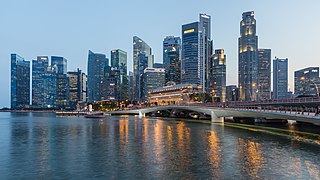
The economy of Singapore is a highly developed free-market economy with dirigiste characteristics. Singapore's economy has been consistently ranked as the most open in the world, the joint 4th-least corrupt, and the most pro-business. Singapore has low tax-rates and the highest per-capita GDP in the world in terms of purchasing power parity (PPP). The Asia-Pacific Economic Cooperation (APEC) is headquartered in Singapore.
The New Zealand electricity market (NZEM) is a decentralised electricity market regulated by the Electricity Industry Participation Code administered by the Electricity Authority (EA). The authority was established in November 2010 to replace the Electricity Commission.
In a broad sense, an electricity market is a system that facilitates the exchange of electricity-related goods and services. During more than a century of evolution of the electric power industry, the economics of the electricity markets had undergone enormous changes for reasons ranging from the technological advances on supply and demand sides to politics and ideology. A restructuring of electric power industry at the turn of the 21st century involved replacing the vertically integrated and tightly regulated "traditional" electricity market with multiple competitive markets for electricity generation, transmission, distribution, and retailing. The traditional and competitive market approaches loosely correspond to two visions of industry: the deregulation was transforming electricity from a public service into a tradable good. As of 2020s, the traditional markets are still common in some regions, including large parts of the United States and Canada.

The Land Transport Authority (LTA) is a statutory board under the Ministry of Transport of the Government of Singapore.
Urban planning in Singapore is the direction of infrastructure development in Singapore. It is done through a three-tiered planning framework, consisting of a long-term plan to plot out Singapore's development over at least 50 years, a Master Plan for the medium term, and short-term plans, the first two of which are prepared by the Urban Redevelopment Authority (URA) and the last by multiple agencies.

Ergon Energy Network is a subsidiary company of Energy Queensland Limited (EQL) a Government owned corporation owned by the Government of Queensland. It distributes electricity to around 763,000 customers across Queensland, excluding South East Queensland through a distribution network regulated by the Australian Energy Regulator (AER) who set the prices that Ergon is allowed to charge for distribution.
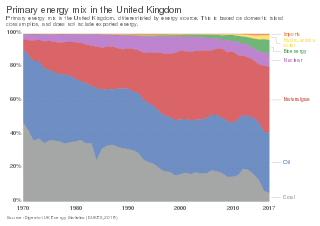
The energy policy of the United Kingdom refers to the United Kingdom's efforts towards reducing energy intensity, reducing energy poverty, and maintaining energy supply reliability. The United Kingdom has had success in this, though energy intensity remains high. There is an ambitious goal to reduce carbon dioxide emissions in future years, but it is unclear whether the programmes in place are sufficient to achieve this objective. Regarding energy self-sufficiency, UK policy does not address this issue, other than to concede historic energy security is currently ceasing to exist.

The Agency for Science, Technology and Research (A*STAR) is a statutory board under the Ministry of Trade and Industry of Singapore.

Singapore Power Limited, doing business as SP Group is a state-owned electricity and gas distribution company in Singapore. SP Group is the corporatised entity of the former electricity and gas departments of the Public Utilities Board (PUB). SP Group was first incorporated as a commercial entity on 1 October 1995 as Singapore Power and Gas to take over the electricity and gas businesses of the state provider, PUB.

The energy policy of the European Union focuses on energy security, sustainability, and integrating the energy markets of member states. An increasingly important part of it is climate policy. A key energy policy adopted in 2009 is the 20/20/20 objectives, binding for all EU Member States. The target involved increasing the share of renewable energy in its final energy use to 20%, reduce greenhouse gases by 20% and increase energy efficiency by 20%. After this target was met, new targets for 2030 were set at a 55% reduction of greenhouse gas emissions by 2030 as part of the European Green Deal. After the Russian invasion of Ukraine, the EU's energy policy turned more towards energy security in their REPowerEU policy package, which boosts both renewable deployment and fossil fuel infrastructure for alternative suppliers.
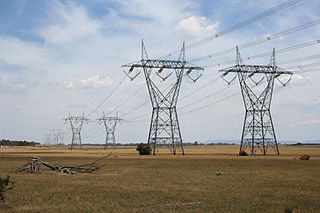
Energy in Victoria, Australia is generated using a number of fuels or technologies, including coal, natural gas and renewable energy sources. Brown coal, historically, was the main primary energy source for the generation of electricity in the state, accounting for about 85% of electricity generation in 2008. The amount of coal-fired power has decreased significantly with the closure in 2017 of the Hazelwood power station which supplied around 20% of Victoria's electricity, and to a lesser extent with the exit of Anglesea power station in 2015. Brown coal is one of the largest contributors to Australia's total domestic greenhouse gas emissions and a source of controversy for the country. Australia is one of the highest polluters of greenhouse gas per capita in the world.
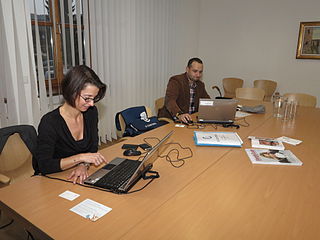
E-Control (ECG) is the government regulator for electricity and natural gas markets in Austria. It was founded in 2001 on the basis of the Energy Liberalisation Act. E-Control's main duty as the independent regulatory authority is to "oversee and to control the Austrian gas and electricity market in the best interest of the consumer".
The electricity sectors of the Republic of Ireland and Northern Ireland are integrated and supply 2.5 million customers from a combination of coal, peat, natural gas, wind and hydropower. In 2022, 34 TWh were generated. In 2018 natural gas produced 51.8%, while wind turbines generated 28.1%, coal 7%, and peat 6.8% of Ireland's average electricity demand. In 2020 wind turbines generated 36.3% of Ireland's electrical demand, one of the highest wind power proportions in the world. While the United Kingdom was one of the first countries in the world to deploy commercial nuclear power plants, the island of Ireland has never had a nuclear power plant built on either side of the Irish border. Nuclear power in Ireland was discussed in the 1960s and 1970s but ultimately never phased in, with legislation now in place explicitly forbidding its introduction.
The Office of Electricity (OE) is a program office within the United States Department of Energy. The mission of OE is to work "closely with [...] private and public partners" and "lead the Department’s efforts to ensure that the Nation’s most critical energy infrastructure is secure and resilient." It does this through research and development of new technologies and overseeing the Federal and state electricity policies and programs for planning and market operations.
Singapore International Energy Week (SIEW) is an annual week-long energy conference for interested parties. The week comprises several exhibitions, workshops, and networking sessions focused on fundamental issues within the energy industry. The first event was held in 2008. Singapore's Energy Market Authority (EMA) organized the event.

Energy in Singapore describes energy related issues in Singapore, which is a developed country located in Southeast Asia. Energy exports to others are about three times the primary energy supplied in the country itself. Additionally, oil imports in relation to the population demands of the country itself are concerningly high.

An energy transition is a significant structural change in an energy system regarding supply and consumption. Currently, a transition to sustainable energy is underway to limit climate change. It is also called renewable energy transition. The current transition is driven by a recognition that global greenhouse-gas emissions must be drastically reduced. This process involves phasing-down fossil fuels and re-developing whole systems to operate on low carbon electricity. A previous energy transition took place during the industrial revolution and involved an energy transition from wood and other biomass to coal, followed by oil and most recently natural gas.
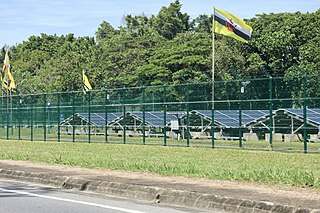
Only 0.05% of Brunei's power was generated using renewable energy, with the remaining 99.95% coming from fossil fuels. The nation established a 10% renewable energy target in the electricity generating mix by 2035 in 2014. When it comes to renewable energy, Brunei has yet to significantly advance and establish itself as a desirable location for investment. From 2020 to 2035, the percentage of renewables must rise by 0.66% year in order to reach the aim. To further the growth of renewable energy, particularly solar energy, which is more plentiful than wind energy, the nation still has to implement a regulatory framework.
ES Power is an electricity retailing service started by Environmental Solutions (Asia) Pte. Ltd. in 2016. ES Power was the first electricity service in Singapore to offer complete carbon offset to its customer for their electricity. Carbon offsets are given through carbon credits which, in turn, are used to invest in non-renewable energy related projects around the globe, especially in developing countries. ES Power has since be re-branded as ES Living and focuses more on the environmental attributes.

Senoko Energy is a Singaporean electric utility company and retailer. It is the largest power generation company in Singapore, accounting for approximately 20% of the nation's electricity supply. It also operates the Senoko Power Station, the nation's largest power plant by generation capacity. Since 2008, it has been owned by Lion Power, a consortium led by Japanese trading company, Marubeni.













